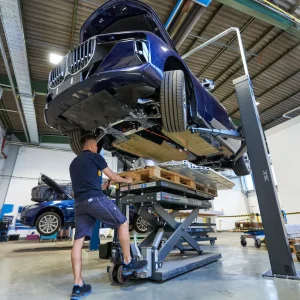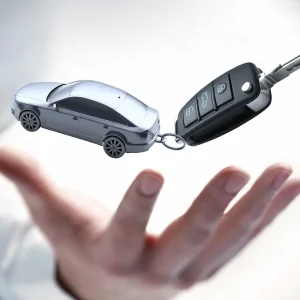Remapping or chipping – the reconfiguration of the engine’s computer brain that is traditionally associated with making a vehicle more powerful – isn’t a new thing. It’s been around for years and is well established as the first port of call for altering the performance of, in particular, diesel engines.
A remap can also, however, optimise a vehicle’s settings to improve economy and emissions. And in a lot of cases you can have your cake and eat it, as a chip for better fuel consumption and lower CO2 often goes hand-in-hand with improved performance.
The stigma is the worrying knock-on effects that come with any modification of this ilk, such as voiding the manufacturer’s warranty, costlier insurance premiums and damaging a vehicle’s residual values, which explains why it hasn’t caught on in the fleet community – until now.
BT Fleet is the first high-profile company in the business car arena to buy into the movement in a big way. The firm, which ranks 10th in BusinessCar’s BC50 list of the top 50 leasing companies, paired up with remapping specialist Viezu Technologies (see page 5 for news of another Viezu deal) to roll out a modification package across part of its fleet.
Open reach
The process began more than two years ago with a series of tests and pilot schemes with the company’s own fleet of Openreach vans. Sales and marketing director, Joe Fielder, explains: “For the past four to five years, we’ve been looking at the economic reality of the market and trying to work out how we find fuel efficiencies.

“We put 200 [modified vans] out [to the Openreach drivers] without telling them the vans had been remapped. Half of them thought there wasn’t any difference and half of them thought the vans were quicker.”
Testing and pilot schemes were followed by a gradual and then an accelerated roll-out across the 24,000-strong Openreach fleet. BT claims the modification creates, on average, an 11% fuel economy saving and a 20% reduction in emissions.
“Over a year, it’s the equivalent of taking 1900 black cabs off the road in terms of CO2,” says Fielder. Don’t expect any tax breaks for subsequent lower emissions, though, because the manufacturers’ figure is final, regardless of any modifications.
There isn’t much impact on downtime for the vehicle, either. Fielder reckons the work can be done “inside 20 minutes” and can also be incorporated into a vehicle’s service plan, so the tweak could take place while it’s already booked in for another maintenance job.
Jamie Turvey, technical director at tuning specialist Superchips, says it can be a case of no downtime at all for fleets: “A fleet workshop can do the work themselves. They can do it overnight if they keep the vehicles there or on weekends, bank holidays etc. by downloading it from our database. There should be no downtime for the vehicle.”
BT Fleet is so confident in its programme that it has gone one step further and is now offering a remapping service to its existing clients, with plans to roll it out as “a standalone service” to new customers in future.
Fielder continues: “We’re offering it to existing customers that we fleet-manage. We know when they’re due in and we can do the work then.
“The fuel technology and the remapping ability is less than half of the value. The value is in the ability to do it in an efficient way, a way that fits in with the SMR schedule and with a backed fitting process.
“We predict the market will broaden for this.”
The company would not put a figure to the cost of the service, saying it depends on each fleets’ requirements, although it claims a three-month return on investment, with continuing economy benefits in the long run.

The big issues
As positive as all that sounds, the very idea of modifying a business vehicle is usually enough to send most fleet operators packing.
As mentioned earlier, there are three chief concerns – the potential impact on warranty, insurance premiums and residual values – for any business that is considering a remap for its vehicles and they’re arguably the reasons why the practice hasn’t been adopted in large numbers.
Fleet operators are right to be cautious because simply commissioning a remap without any preparation will probably hit you in at least one, if not all three ways. A pragmatic approach and some homework beforehand can make the modification a viable process, though.
BT Fleet’s approach was to remap the vehicles within the confines of the existing manufacturer’s settings, so theoretically the vehicle is still abiding to the published parameters.
Fielder explains how that’s possible: “There is a tolerance within the ECU settings and the adjustments sit inside these tolerances.
“Manufacturers’ vehicles are set with a relatively wide tolerance and the remap is made within that. If it is professionally done there is no effect on the warranty and my understanding is that there is no effect on the remarketing and insurance.”
Other businesses that have taken the plunge have had different ways of addressing the warranty issue. According to Superchips’ Turvey, businesses that operate older vehicles will wait until the manufacturer’s warranty has expired before carrying out the remap, while those with more compressive fleet management set-ups have other ways around it.
“Some fleets will wait until a certain mileage or age before carrying out the work, so the warranty no longer applies.
“If a fleet is maintained by its own workshops then they can use their own initiative. So if, say, a door lock fails, then that’s obviously nothing to do with the remap and the warranty isn’t an issue.”
Rupert Pontin, chief car editor at RV specialist Glass’s Guide, remains sceptical about the fallout of remapping on a vehicle’s resale value: “I have yet to see any evidence that contradicts the assumption that this activity damages the residual value.
“To remarket a modified vehicle, the changes need to be declared at the time of sale. As a result, to a trade buyer this means they must also declare these changes when retailing the car.”
The modification is, however, reversible, so vehicles that have undergone it can be put back to their original settings before they’re sold on. Fielder continues: “Come remarketing time, everything can be reversed to the manufacturer’s standard, or optimised further.”
Being upfront
In fact, Fielder is so confident about the technology that he believes it could actually have a beneficial knock-on effect on a vehicle’s value when it is defleeted. “As this becomes more broadly accepted, we may find that, at remarketing time, the vehicle is worth more because it has lower CO2 and it’s more efficient, but I think we’d need a few van cycles before we’d know for sure,” he says.
The commonly held belief is that any sort of modification is likely to play havoc with your insurance premiums and end up costing you a lot more. However, if you’re investing in a remap with the sole purpose of improving economy, you’re upfront with the insurance company and it’s professionally fitted, then there’s no reason that your premium should increase.
A spokesman for Aviva told BusinessCar: “Any time you make a modification you need to let your insurer know. However, chipping for fuel economy – that’s something we would be happy to support. If you’re chipping for economy then generally this won’t have an impact on your premium.
“You still need to let us know, but on a general basis, it’s fine. It’s about being upfront and disclosing the facts. Obviously, some people will chip to get a bit more power as well, which could incur a additional premium, and some people may carry out other modifications at the same time, but just let us know.”
Turvey says that, even when a power increase is involved – as it can be simultaneously with an economy remap – insurance firms won’t necessarily up your premium. It just depends on the company, so the advice is simply to be honest and talk to your provider before you do anything.
“Some [insurers] say ‘great, just let us know’, while others say ‘no more than a 30% power increase’. That’s fine, though, because what we’re looking for is extra torque rather than a large power increase.”
Fuel additives: an alternative to remapping?

It is possible to garner better fuel economy, lower emissions and a bit more power without having to modify the vehicle. Deposits from fuel – particularly low-grade, low-cost supermarket stuff and biodiesel – build up and cling to the engine’s vitals over time, and can hamper all of the above elements.
ACFO has cottoned on to the issue and is running courses with engine treatment specialist Forte Lubricants entitled ‘Introduction to Contamination’ on 16 and 17 July in Coventry (see www.acfo.org or email info@acfo.org for more), while fellow treatment firm Techron has launched a pair of additives – one for petrols and one for diesels – that supposedly have real clout for cleaning up engines.
Both are designed to clean up the internal components that, over time, are the most likely to suffer from a build up of deposits.
Mieke Mortier, senior chemist at Techron’s parent company Chevron, explains: “It cleans up the deposits, brings the engine back to maximum power, lowers the emissions and optimises the performance. The injectors, the intake valves and the combustion chamber are the crucial areas.”
The company acknowledges that there are a lot of fuel additives on the market anyway, describing it as “awash with additives that don’t do anything”. It also claims that some of them are, in fact, counter productive and can make engines worse.
In an effort to stand out from the crowd, Techron has carried out a lot of independent testing, which, for its diesel additive, showed an average 7.6% increase in fuel economy, a 6.5% drop in CO2 and 3.4% power hike.
Brian Hayes, channel programme specialist at Techron, admits that fleets running brand new vehicles for a short period of time won’t see much of an improvement, but those operating vehicles over a slightly longer lease period will get the benefits: “If you’re running a brand new fleet with vehicles that are less than one year old on good quality fuel then. I don’t think you’ll see a big change.
“When you’re running vehicles for four or five years then there’s a definite benefit to be had. There’s quite a dramatic drop-off in mpg after two years. With extended fleet changeover periods, there are a lot of older vehicles that may have a lot of deposits on board.
“It’s down to the vehicles, the type of operation, the type of fuel and how long you plan on keeping them.”
Less of an off-the-shelf product, Techron is supplying the additives directly to the garage trade. Businesses can specify it with their service provider as part of the service package.
In terms of cost, Hayes surmises: “When it’s retailed as a single service product to consumers it costs £15 to £20, but if a consumer pays this much then a fleet operator will pay less. I’d imagine that a fleet operator with a major contract will pay significantly less.”





